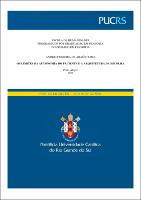| Share record |


|
Please use this identifier to cite or link to this item:
https://tede2.pucrs.br/tede2/handle/tede/10321| Document type: | Tese |
| Title: | Os limites da autonomia do paciente e a arquitetura da escolha |
| Author: | Lima, Andrei Ferreira de Araújo  |
| Advisor: | Weber, Thadeu |
| Abstract (native): | A presente tese, preocupada com a supervalorização do princípio da autonomia dentro do campo da Bioética, mormente em relação à corrente principialista, busca aprofundar a temática, de modo a encontrar limites mais claros ao poder decisório do paciente, sem que isso signifique uma retomada do paternalismo médico ou a supressão da autonomia. Em que pesem as justas críticas endereçadas à Bioética baseada na autonomia e, consequentemente, aos postulados kantianos, que são em grande medida os fundamentos da referida corrente, a presente tese defende a manutenção do raciocínio das máximas do filósofo prussiano, ou seja, defende-se que a autonomia (capacidade de autodeterminação) é o fundamento da dignidade, e que essa, por sua vez, está diretamente ligada ao conceito do ser humano sempre como fim em si mesmo e nunca, simplesmente, como meio. Por outro lado, as críticas não podem ser ignoradas, principalmente aquelas advindas da neurociência que, a partir de estudos da economia comportamental, comprovaram que o ser humano não raramente age de modo inconsciente contra os seus próprios interesses, ou seja, a crença na racionalidade plena deve ser revisitada. Nesse sentido, a presente tese defende a inserção do conceito da arquitetura da escolha e da ética da influência, ambos vinculados ao paternalismo libertário, no ambiente médico-hospitalar e na relação médico-paciente. Trata-se de conceitos, cuja aplicação visa a auxiliar os sujeitos a tomarem as melhores decisões de acordo com seus melhores interesses, promovendo diálogo entre as pessoas envolvidas. Defende-se que a arquitetura da escolha seja a justa medida para harmonizar a autonomia do paciente com o paternalismo médico. Os limites à autonomia serão estabelecidos antes mesmo da formulação da arquitetura, restando, então, apenas as opções ética e legalmente cabíveis. Ao médico, neste segundo momento, caberá exercer a influência para que o paciente escolha o tratamento mais eficaz, deixando-o, contudo, livre para escolher outras possibilidades ou até mesmo recusá-las, promovendo sua autonomia, respeitando sua dignidade, tratando-o como fim em si mesmo. |
| Abstract (english): | The present thesis, concerned with the overrating of the principle of autonomy in the field of Bioethics, especially in relation to the principlist current, aims to deepen the theme in order to clarify the limits of the decision-making power of the patient, avoiding a resumption of the medical paternalism or the suppression of autonomy. Despite the fair criticisms addressed to Bioethics based on autonomy and, consequently, to the Kantian postulates, which are in a large extent the foundations of that current, the present thesis defends the maintenance of the logic of the Prussian philosopher's maxims, that is, it defends that autonomy (capacity for self-determination) is the foundation of dignity, and that dignity is directly linked to the concept of the human being, always as an end in itself and never simply as a mean. On the other hand, the critics cannot be ignored, especially those coming from neuroscience which, based on behavioral economics studies, have proven that human beings often unconsciously act against their own interests, that is, the belief in human rationality must be reviewed. In this sense, the current research defends the insertion of the concept of the architecture of choice and the ethics of influence, both linked to libertarian paternalism, in the hospital environment and in the doctor-patient relationship. The concepts aim to help subjects to make the best decisions according to their best interests, promoting dialogue between those involved in the environment. It is argued that the architecture of choice is the right measure to harmonize patient autonomy with the medical paternalism. The limits to autonomy will be established even before the architecture is formulated, leaving, then, only the ethically and legally applicable options. The doctor, in this second moment, will be responsible for promoting influence so that the patient chooses the most effective treatment, leaving him, however, free to choose other possibilities or even refuse them, promoting his autonomy, respecting his dignity, treating him as an end in itself. |
| Keywords: | Bioética Autonomia Paternalismo Arquitetura da Escolha Ética da Influência Paternalismo Libertário |
| CNPQ Knowledge Areas: | CIENCIAS HUMANAS::FILOSOFIA |
| Language: | por |
| Country: | Brasil |
| Publisher: | Pontifícia Universidade Católica do Rio Grande do Sul |
| Institution Acronym: | PUCRS |
| Department: | Escola de Humanidades |
| Program: | Programa de Pós-Graduação em Filosofia |
| Access type: | Acesso Aberto |
| Fulltext access restriction: | Trabalho será publicado como artigo ou livro |
| Time to release fulltext: | 12 meses |
| Date to release fulltext: | 24/06/2023 |
| URI: | https://tede2.pucrs.br/tede2/handle/tede/10321 |
| Issue Date: | 31-Mar-2022 |
| Appears in Collections: | Programa de Pós-Graduação em Filosofia |
Files in This Item:
| File | Description | Size | Format | |
|---|---|---|---|---|
| TES_ANDREI_FERREIRA_DE_ARAUJO_LIMA_COMPLETO.pdf | ANDREI_FERREIRA_DE_ARAUJO_LIMA_TES | 2.04 MB | Adobe PDF |  Download/Open Preview |
Items in DSpace are protected by copyright, with all rights reserved, unless otherwise indicated.




